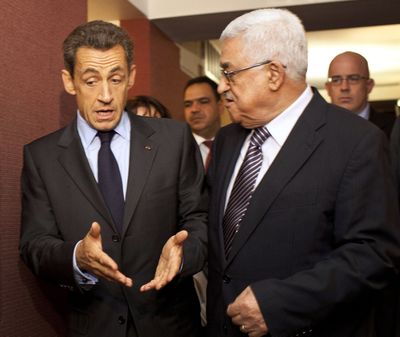Palestinian bid facing delay
U.S. working to avoid casting veto

UNITED NATIONS – Diplomats on Tuesday raced to nail down a plan to deflect the Palestinian bid for statehood at the United Nations, crafting a face-saving formula that could lessen the immediate prospect of a Security Council veto, which the Obama administration desperately sought to avoid.
Under the plan, debate on the application for recognition, which Palestinian Authority President Mahmoud Abbas plans to make Friday, would be put off indefinitely. That would buy time for the United States to try to restart negotiations between Israel and the Palestinians, and would keep $600 million a year in American aid and other international assistance flowing to the Palestinians. Congress had threatened to cut the U.S. aid.
Diplomats said Abbas had signed off on the plan.
The scenario, which Western officials have been trying to engineer behind the scenes for weeks, “is now likely,” a senior European diplomat said.
Hanan Ashrawi, a Palestinian legislator and ally of Abbas, said Palestinian officials are willing “to accept some delay, of the kind you would have under normal United Nations procedures.”
But she said that if the United States or other countries delay the process to undermine the Palestinians’ bid for enhanced international standing, “we have recourse to other action,” such as approaching the General Assembly rather than the Security Council.
The General Assembly is regarded as being more pro-Palestinian.
Palestinian officials recently had expressed concern that the U.S. was lobbying hard against its measure, pressuring Security Council members to vote against it or at least abstain. The focus has centered on nations such as Gabon, Bosnia-Herzegovina and Portugal. Palestinians had predicted that they would win support from at least nine of the 15 Security Council members, the minimum needed for approval absent a veto by one of the five permanent members. But they acknowledged that they were not 100 percent confident.
Abbas this year decided to approach the United Nations because of his frustration that nearly two decades of U.S.-led negotiations had not led to the establishment of an independent Palestinian state. Israel has feared that the Palestinians would use enhanced status at the U.N. to take legal redress against it in the International Criminal Court and other institutions.
A move to slow the deliberations will ease the current crisis atmosphere, avoiding a confrontation with the United States while allowing Abbas to say that he had fulfilled his promise to formally seek U.N. membership.
The Security Council has sometimes moved immediately on membership requests, as it did this year on the application of South Sudan. But in other cases, it organizes committees to deliberate on the matter.